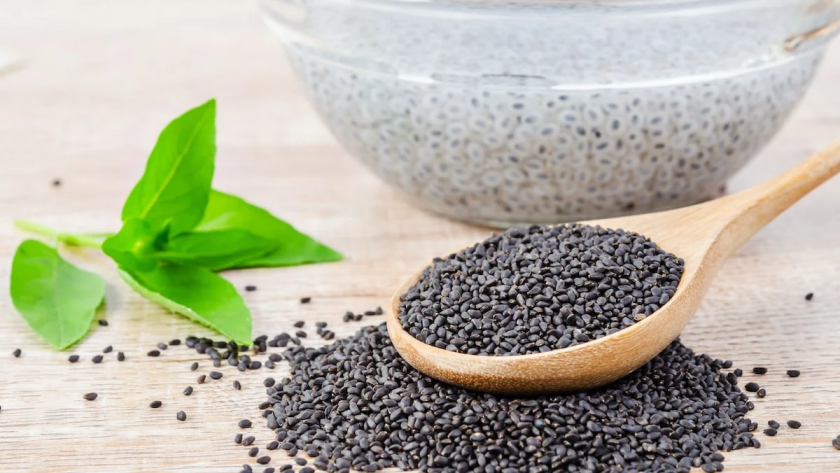Basil is an aromatic and highly flavorful herb often used in Italian, Thai, Vietnamese, and Mediterranean cuisine. It has a strong flavor and has a sweet and slightly peppery taste. Not just the basil but the seeds of this plant are also edible. In fact, basil seeds are a great source of nutrients and have long been a part of Ayurvedic and Chinese medicine. Basil seeds’ benefits span from weight control to digestive health and skin nourishment.
These small, black, gelatinous seeds are consumed after soaking in water for a few hours. They taste similar to chia seeds and are often consumed with fruit juices. Basil seeds are highly nutritious and believed to have numerous health benefits, such as maintaining great gut health, promoting weight loss, relief in constipation, and providing a cooling effect to the body. They are rich in essential fatty acids, minerals, anti-oxidants, and fiber.
So, if you’re considering adding basil seeds to your diet, first read this article to learn about its benefits and the correct way to consume them. So, let’s get started!
10 Health Benefits of Basil Seeds
Here’s a list of basil seed (Sabja seeds) benefits you might not know before. Even if you know a few, you will definitely learn something new today.
#1. Nutrient-rich
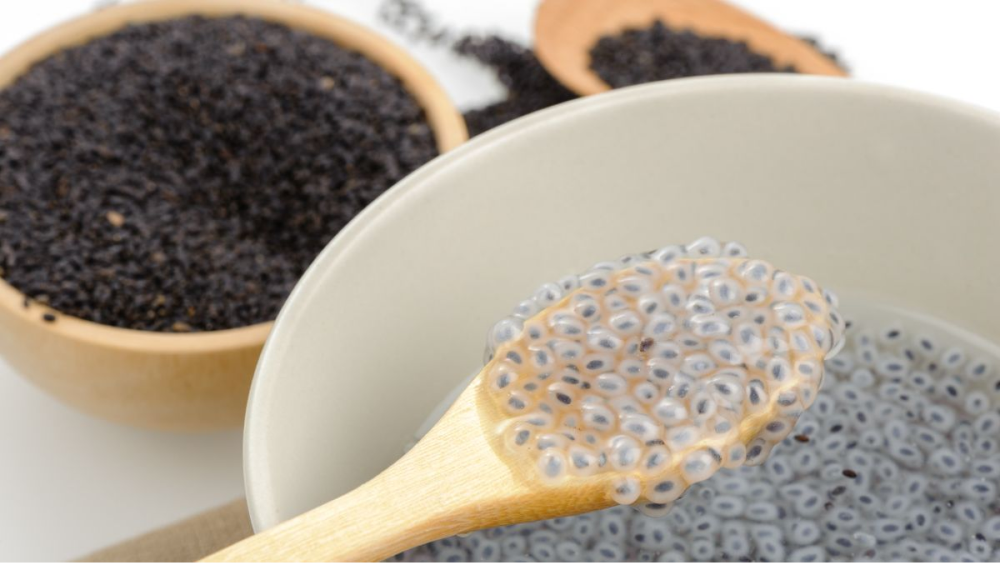
Basil seeds are rich in fiber, minerals, vitamins, and other nutrients, which makes them a superfood. They are better and more natural than many synthetic health supplements on the market. The nutrient-rich content of basil seeds include
- Iron
- Calcium
- Vitamin A, K
- Omega-3 fatty acids
- Magnesium
- Protein
The rich content of fiber, minerals, and vitamins provides a number of health benefits when added to your daily diet. The richness of these nutrients has given basil seeds the popularity as a healthy and functional ingredient.
#2. Keeps You Hydrated
Apart from its nutrient content, basil seeds’ hydrating properties prevent dehydration, especially during hot weather. They are usually consumed after soaking in water for at least half an hour. When soaked, they swell and form a gel-like coking that retains water.
Additionally, basil seeds contain all the essential electrolytes, such as magnesium and potassium. These electrolytes help maintain fluid balance in the body and aid nerve functioning. They absorb water and form a gel-like consistency, which helps boost hydration.
#3. Helps in Weight Management
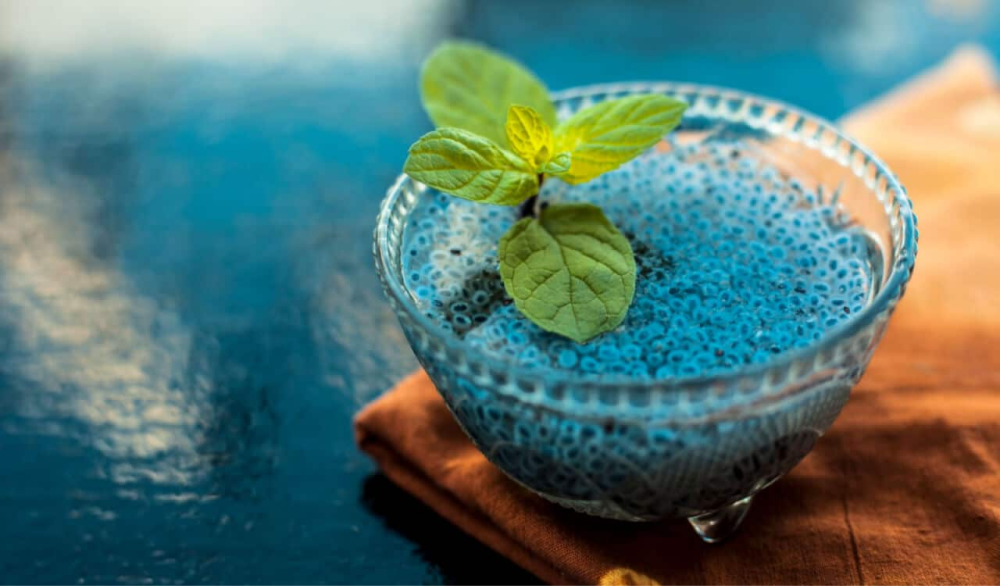
As said earlier, basil seeds are high in fiber, which is quite beneficial for weight loss. Even a tablespoon of basil seeds contains about 7% fiber, which is 25% of the daily recommended intake. The richness of fiber helps in weight loss and reduces calorie intake.
Basil seeds help with weight control by promoting the feeling of fullness, which reduces overeating when added to a calorie-controlled diet. This can support your weight loss efforts alongside a balanced diet and regular exercise.
#4. Best for Digestive Health
Basil seeds are renowned for their soothing and anti-inflammatory properties, which are beneficial for gut health. Their active ingredient, eugenol, can help calm the gastrointestinal tract. Additionally, the high fiber content helps with regular bowel movement and constipation. These tiny black seeds act as prebiotics, giving all the necessary nourishment to the microbiome. They are the best food and supplements for better digestive health.
The high fiber content and probiotic properties of basil seeds make it a key ingredient for products based on gut health and regularity.
#5. Helps in Diabetes Control
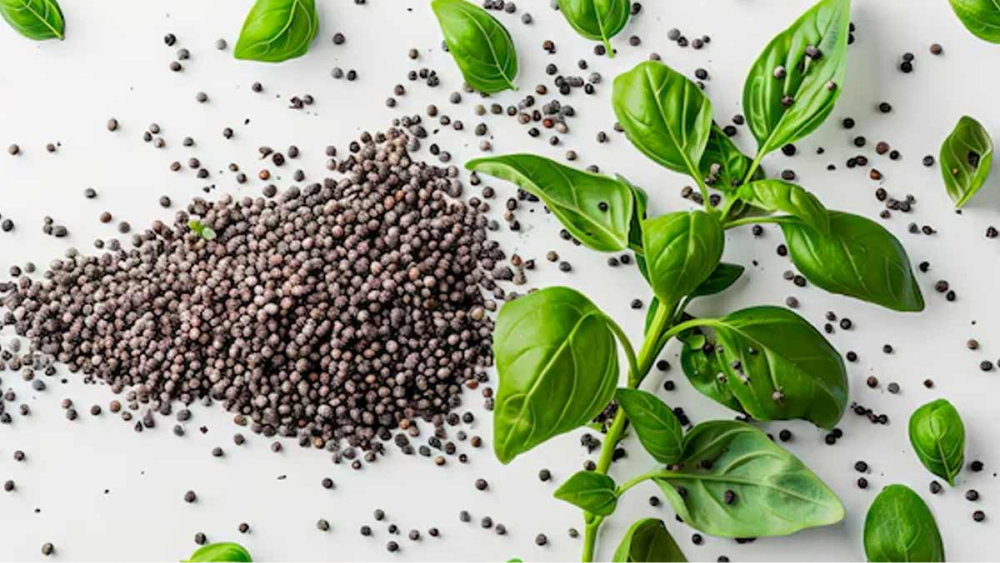
Apart from aiding the digestive system, the high fiber content in basil seeds helps regulate blood sugar levels in your body. These seeds slow down the absorption of carbohydrates. Although it is considered best for diabetes management in Ayurveda, there isn’t much evidence supporting this claim in modern medicines.
Basil seeds can be used in dietary supplements, functional foods, and formulas to maintain the body’s glucose levels. However, science and health professionals are working in this area to find the potential benefits of basil seed in blood sugar regulation.
#6. Beneficial for Heart Health
The soluble fiber in basil seeds has proven to be beneficial for cardiac health. They can help in lowering down the LDL cholesterol levels. These seeds also contain plant compounds that help improve blood flow, relax blood vessels and reduce high blood pressure.
Adding basil seeds to your daily diet promotes healthy cholesterol levels, maintains right blood pressure, and reduces the risk of cardiac diseases, which makes it a key ingredient for developing products related to cardiovascular wellness.
#7. Rich in Anti-oxidants
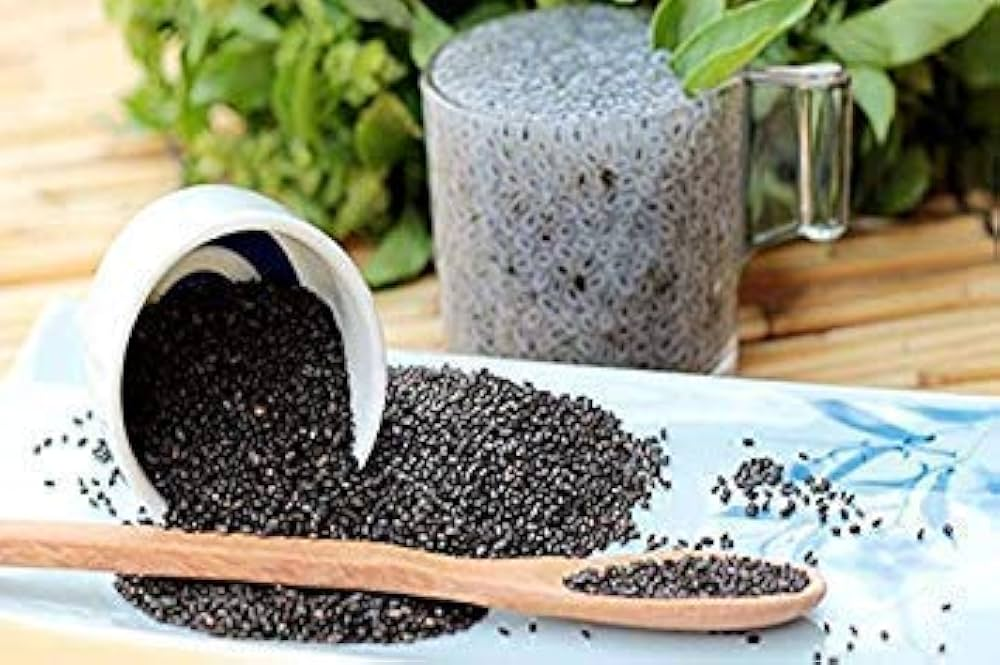
Basil seeds are packed with antioxidants, such as flavonoids, phenolic compounds, and carotenoids. These antioxidants play a crucial role in neutralizing harmful free radicals, which helps reduce inflammation and protect the body from oxidative damage.
The high antioxidant content in basil seeds can potentially lower the risk of chronic diseases like heart disease, cancer, and neurodegenerative disorders.
Basil seeds are incredibly versatile and can be used in various products, including functional beverages, nutritional bars, dietary supplements, and personal care items.
Highlighting their antioxidant benefits can emphasize their importance in supporting overall health and reducing the risk of chronic diseases. This makes them a valuable ingredient in products promoting wellness and preventing disease.
#8. Reduces Inflammation in the Body
Basil seeds are rich in anti-inflammatory compounds like eugenol, rosmarinic acid, and caffeic acid, which can help alleviate inflammation. This makes them potentially useful in managing conditions such as arthritis, cardiovascular diseases, digestive issues, and skin problems.
Brands can incorporate basil seeds into various products, including functional foods, dietary supplements, skincare items, and herbal remedies, offering natural solutions for inflammation and related health concerns.
The anti-inflammatory benefits of basil seeds and their potential to ease various health conditions can be a key selling point when developing innovative, wellness-oriented products.
#9. Promotes Skin Health
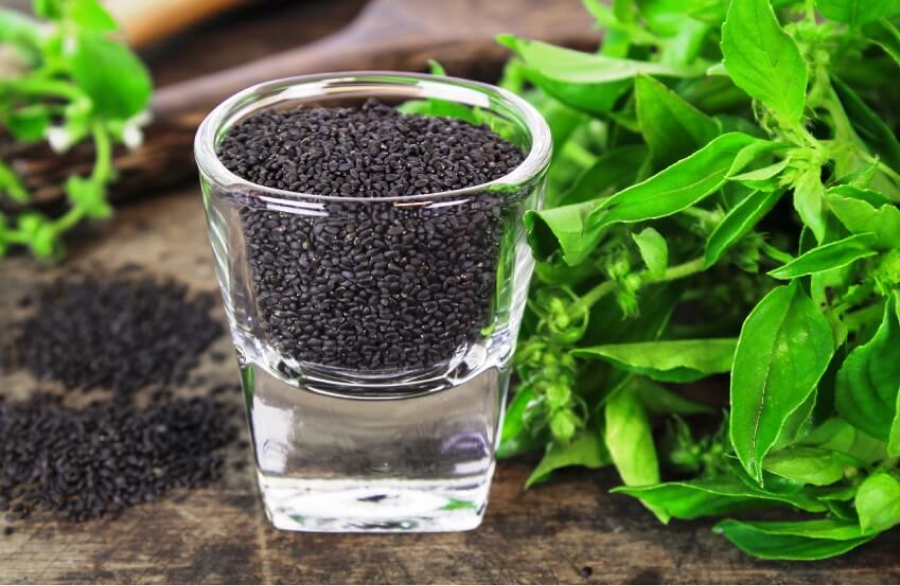
Basil seeds are packed with essential vitamins and minerals that are beneficial for skin health, such as vitamins A, C, and E, along with magnesium and zinc.
Including basil seeds in your diet can enhance skin hydration, shield against environmental damage, minimize fine lines and wrinkles, even out skin tone, and aid in wound healing. These attributes make basil seeds a valuable ingredient for skincare products, dietary supplements, and functional foods.
Their rich nutrient profile, vital vitamins and minerals, and their antioxidant properties can significantly contribute to various aspects of skin health and appearance. This presents a promising opportunity for brands to create skin-focused products.
#10. Respiratory Health
Basil seeds have long been believed to aid respiratory health by easing conditions like asthma and bronchitis. This is attributed to their supposed soothing effects on the respiratory system. The potential benefits may stem from their anti-inflammatory properties, antioxidant activity, and possible bronchodilatory effects.
While incorporating basil seeds into respiratory health products is conceivable, it is crucial to highlight the necessity for solid scientific evidence to substantiate any health claims or marketing efforts.
Although scientific research in this field is limited, basil seeds’ potential anti-inflammatory and antioxidant properties might contribute to their traditionally perceived benefits. Further investigation and research are needed to understand better the feasibility of using basil seeds for respiratory health applications.
How to Consume Basil Seeds?
With the benefits of basil seeds, how to use them is also something most people need to learn. Here is how you can consume basil seeds:
- Soak basil seeds in water for at least 30 minutes before consuming them. They swell and form a gel-like coating and expand three times in size. You can drink this basil seeds water to keep hydrated all day long, especially in summer.
- If you don’t like to drink basil seeds water, you can add them to your favorite beverage, such as smoothies, milkshakes, lemonade, etc.
- You can also eat basil seeds by sprinkling them over salads to enhance their nutritional value.
- Add basil seeds to yogurt or other dairy products for nutritional taste.
- You can even garnish these basil seeds on ice-creams and desserts.
Conclusion
Although basil seeds hold medicinal applications in both Ayurvedic and Chinese medicine, research on their scientific benefits is still underway. As with any drink, it should be consumed in moderation as a part of a balanced diet.
Excessive consumption of basil seeds may lead to serious side effects, like diarrhea, Gastrointestinal issues, harmonical effects, etc. So it is better to consult your doctor before making any dietary changes.
FAQs
What is the Best Way to Eat Basil Seeds?
The best way to consume basil seeds is by soaking them in water for about 15-30 minutes until they swell. You can then add them to drinks, smoothies, or desserts for a nutritious boost.
How Many Basil Seeds to Eat Per Day?
It is generally recommended to consume no more than two teaspoons of basil seeds per day. However, it’s best to consult with a healthcare professional to determine the ideal amount for you.
Can I Eat Raw Basil Seeds?
It is not advisable to eat basil seeds raw as they are hard to chew and may cause digestive issues. Soaking them in water before consumption is recommended to make them easier to digest.
What is the Best Time to Take Basil Seeds?
There is no specific best time to take basil seeds, but they can be consumed at any time of the day. Many people prefer to take them in the morning or before meals to help with digestion and satiety.
